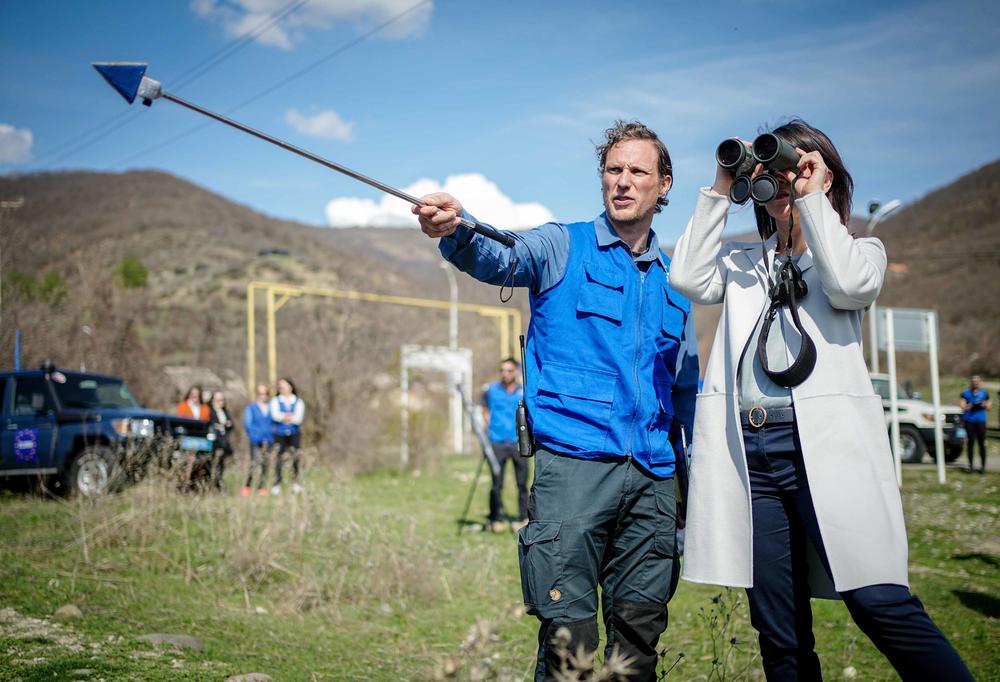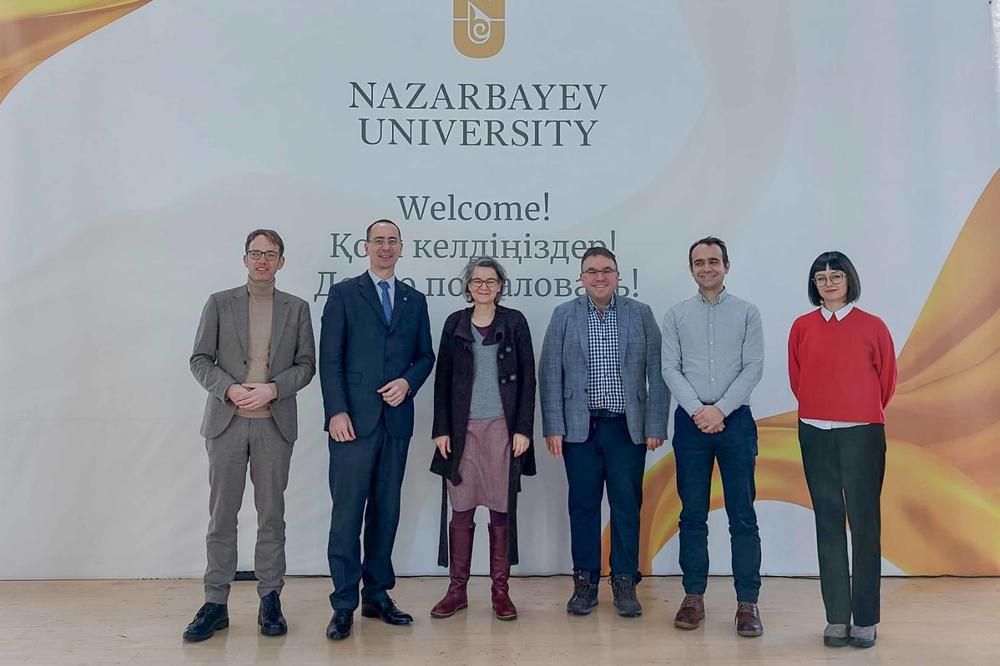Changing Perspectives
The Russian attack on Ukraine on February 24, 2022, changed the world. The Institute for East European Studies at Freie Universität Berlin is adjusting its research focus and placing more emphasis on Southeastern Europe, the Caucasus and Central Asia
Feb 22, 2024
As a result of the war in Ukraine, German policy is focusing more attention on the former Soviet republics. The picture shows German Foreign Minister Annalena Baerbock in March 2023 near the administrative line to South Ossetia.
Image Credit: picture alliance/dpa | Kay Nietfeld
Katharina Bluhm had been working on her book for five years. Following extensive research, she wrote a detailed monograph delineating how, from the 1990s onward, Russia developed into a revisionist power of the existing world order. Her focus was on domestic dynamics: the interplay between the Putin regime as it became increasingly ideological and the illiberal-conservative forces in Russian society. Then, just a few weeks before she planned to submit her manuscript, Russia invaded Ukraine on February 24, 2022, and the war began. Bluhm, a professor of sociology at the Institute for East European Studies at Freie Universität Berlin, says, “The world has become a different place because of the war, and of course, that has also changed my book.”
On the basis of her many years of research, Bluhm can trace the gradual process that eventually led to war. She describes it as a process that did not begin in 2012 with Putin’s third term in office, but notes that this process became more intense and radicalized during this term. According to Bluhm, “Ukraine is a battlefield where long-smoldering conflicts are being fought openly.” Even as an expert on the region, she was very shocked about the beginning of the war. “For everyone at the Institute for East European Studies, February 24, 2022, was a turning point.”
Re-evaluating Attitudes and Positions
The Russian attack on Ukraine has brought incredible suffering to millions of people and shattered their otherwise long-standing sense of security. This has not only affected politics and the economy, but also academia. For the Institute for East European Studies at Freie Universität, these changes led to a strategic realignment. Robert Kindler, a professor of history specializing in Eastern and East Central Europe, says, “When the war started, we reacted immediately. At first it was important to us to send a common signal of solidarity to the outside world, while at the same time we needed to be available to offer competent advice to the Executive Board of the university.”
In cooperation with the university management, aid programs were set up very quickly: short-term scholarships and fellowships enabled at-risk scholars and scientists from Ukraine, Russia, and Belarus to continue to conduct research, either in Berlin or remotely. In addition, many employees as well as students at the Institute for East European Studies volunteered where they could. For example, in the spring of 2022, when thousands of Ukrainian refugees arrived at the Berlin central train and bus stations, they helped interpret between German speakers and Ukrainian and Russian speakers. Kindler continues, “After this initial acute phase, we had to think about what the war meant in the longer term, for Eastern Europe, for Eastern European studies as an academic subject, and for our specific work at the institute.”
Susanne Strätling, a professor of literary studies, notes that the Russian attack on Ukraine forced everyone working in Eastern European studies to reconsider their understanding of their field. She says, “Our work has always had a transnational character with a view to the entire Eastern European cultural area. However, Russia was often the preferred frame of reference. It was considered as the center and the other countries the periphery; they were often in the fringes.”
According to Strätling, the scholars working in Eastern European studies are reexamining to what degree their field has reinforced this hierarchy. She says there is now a demand for decolonization of the subject, i.e., for a critical reflection on its colonizing academic traditions, although it is not always clear how this decolonization is supposed to take place and what is actually meant by it. There is a need for greater awareness of the power relations inherent in the knowledge of this subject and how they shape the research itself as well as the theories and methods. Strätling says, “For decades we have spoken about the ‘post-Soviet space.’ Today we need to ask whether by the use of such terms, we are not denying the countries of this region part of their own history, and instead, are defining them only by their former affiliation with the Soviet empire.”
Delegates from the Institute for East European Studies at Nazarbayev University in Astana (from left to right): Robert Kindler, Tobias Stüdemann, Susanne Strätling, Theocharis Grigoriadis, Clemens Günther, and Ruslana Bovhyria
Image Credit: Personal collection
Programs Discontinued
For many years the strategic focus of the Institute for East European Studies was on research about Russia. The institute maintained close contact with many highly regarded research institutions in Russia. There were successful joint research projects, exchange programs, and opportunities for German-Russian double degrees, all of which were supported by the Liaison Office of Freie Universität in Moscow. When the war began, all of these programs were put on hold. The liaison office was closed, and in October 2022, it was set up in Tbilisi, Georgia.
Kindler says, “This step was made inevitable both by the EU sanctions as well as an ever-increasing restriction of academic freedom in Russia. In addition, we did not want to continue as before. We decided to realign the institute strategically with a focus on regional diversification.”
Building New Partnerships
The institute is currently establishing new cooperation programs and expanding existing ones with universities in Ukraine, Georgia, Uzbekistan, and Kazakhstan. In addition, there is a new master’s degree program “Economic Systems” designed in cooperation with the University of Belgrade. It was initiated by Theocharis Grigoriadis, a professor of economics at the Institute for East European Studies. It is the second new project, following the bachelor’s degree supplementary course “Deutschland und Europa im Südkaukasus” (Germany and Europe in South Caucasus), which was launched in cooperation with the Tbilisi State University in Georgia in the fall of 2023 and is supported by the German Academic Exchange Service.
In January Theocharis Grigoriadis, Susanne Strätling, and Robert Kindler along with several other colleagues from the Institute for East European Studies went on a trip to Kazakhstan, which had been organized by Tobias Stüdemann, head of the university’s liaison office in Tbilisi. Strätling says, “We are currently experiencing how a new cultural self-image is emerging in many countries in the region. We at the institute are observing this process closely.” The war is acting as a catalyst for new political developments not only for Ukraine, but also in Southeastern Europe, the Caucasus, and in Central Asia. Kindler says, “It is a multi-ethnic space that is reorganizing itself. A reassessment of the individual history of each country as well as their political relations to Russia is taking place.”
A Changing Field: Research on Russia
Simultaneously, the scholars are working on reorganizing their research on Russia. Bluhm says, “In this difficult political situation, we think it is important to maintain our contact with the country as well as to continue to observe it through an analytical lens.” As a social scientist, she has been experiencing how her research work has become increasingly difficult since 2014. She relies on being able to collect data and conduct research on site. She says, “Today it is hardly possible for us to carry out empirical research in Russia. We are not allowed to conduct interviews, and we cannot hire anyone on site to collect data. Even working in archives has become very difficult.”
Now researchers need to resort to other ways to gather information. Bluhm says, “We have to work with what we have. Speeches, decrees, and public debates are still accessible on the internet. We can analyze social media, try to gain access via the diaspora, and follow research and data collection within the country. All of this is possible, even if it is limited.” Kindler points out that there is a trend toward conducting research about Russia rather than with Russia. He notes that the institute faces a double challenge, saying, “We have to continue to develop our research in the region. However, we must also prevent Russia from becoming a black box for the West.”
This article originally appeared in German in the Tagesspiegel newspaper supplement published by Freie Universität Berlin.


